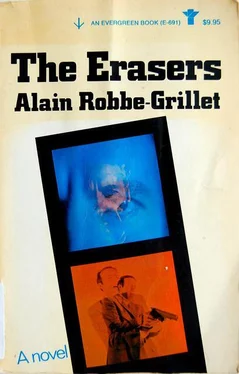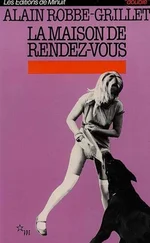Alain Robbe-Grillet - The Erasers
Здесь есть возможность читать онлайн «Alain Robbe-Grillet - The Erasers» весь текст электронной книги совершенно бесплатно (целиком полную версию без сокращений). В некоторых случаях можно слушать аудио, скачать через торрент в формате fb2 и присутствует краткое содержание. Жанр: Криминальный детектив, на английском языке. Описание произведения, (предисловие) а так же отзывы посетителей доступны на портале библиотеки ЛибКат.
- Название:The Erasers
- Автор:
- Жанр:
- Год:неизвестен
- ISBN:нет данных
- Рейтинг книги:4 / 5. Голосов: 1
-
Избранное:Добавить в избранное
- Отзывы:
-
Ваша оценка:
- 80
- 1
- 2
- 3
- 4
- 5
The Erasers: краткое содержание, описание и аннотация
Предлагаем к чтению аннотацию, описание, краткое содержание или предисловие (зависит от того, что написал сам автор книги «The Erasers»). Если вы не нашли необходимую информацию о книге — напишите в комментариях, мы постараемся отыскать её.
The Erasers — читать онлайн бесплатно полную книгу (весь текст) целиком
Ниже представлен текст книги, разбитый по страницам. Система сохранения места последней прочитанной страницы, позволяет с удобством читать онлайн бесплатно книгу «The Erasers», без необходимости каждый раз заново искать на чём Вы остановились. Поставьте закладку, и сможете в любой момент перейти на страницу, на которой закончили чтение.
Интервал:
Закладка:
It is the agreeable face of a dark young woman which appears in its place-the stationery saleswoman from the Rue Victor-Hugo and the echo of her little throaty laugh. Yet her face is serious.
Wallas and his mother had finally reached the dead end of a anal; in the sunlight, the low houses reflected their old facades i the green water. It was not an aunt they were looking for: it as a male relative, someone he had never really known. He did not see him that day either. It was his father. How could he have forgotten it?
Wallas wanders through the city at random. The night is amp and cold. All day long, the sky has remained yellow, low, overcast-promising snow-but it has not snowed, and it is now the November mists that have gathered. Winter is coming early this year.
The lights at the street corners cast reddish circles just strong enough to keep the pedestrian from losing his way. It takes a good deal of care, crossing the street, not to stumble against the curbstones.
In the neighborhoods where the shops are more numerous, le stranger is surprised to find so few shopwindows lighted. Probably there is no need to attract customers in order to sell ice and brown soap. There are few notion stores in this province.
Wallas steps into a crowded, dusty shop that seems intended for the storage of merchandise rather than its retail sale. At the rear, a man in an apron is nailing shut a crate. He stops pounding to try to understand what kind of eraser Wallas wants. He nods several times during the course of the explanation as if he knew what Wallas meant. Then, without saying a word, he walks toward the other side of the shop; he is obliged to shift a large number of objects on his way in order to reach his go; He opens and closes several drawers, one after the other, thin for a minute, climbs up a ladder, begins searching again, wit out any more success.
He comes back toward his client: he no longer has the item. He still had some not long ago-a lot left over from before the war; they must have sold the last one-unless it’s been put away somewhere else: “There are so many things here that you can never find anything.”
Wallas dives back into the night.
Why not go back to the solitary house as well as anywhere else?
As the chief commissioner pointed out to him, Doctor Juard behavior is not absolutely clear-though it is hard to see what his secret role could be. When he walked through the parlor library, the little doctor glanced at Wallas out of the corner of his eye while pretending not to see him through his heavy glasses: yet he had walked through the room on purpose to have a look at him. And several times during their conversation half an hour later, Wallas was amazed at the strange way which Juard expressed himself: he seemed to be thinking of something else and occasionally even to be talking about something else. “He has a bad conscience,” Laurent declares.
Perhaps, too, the businessman Marchat is not so crazy as it seems. After all, to go into hiding was the better part of vale It is strange that the doctor’s account does not make the least allusion to Marchat’s presence in the Rue de Corinthe at the time of the wounded man’s arrival; he has always claimed, to the contrary, that he did not need anyone’s help; yet according to the commissioner, Marchat cannot have invented all the details he reports concerning the professor’s demise. If Juard knew, one way or another, that Marchat was to be murdered tonight in his turn, it would certainly be to his advantage to conceal the businessman’s presence in his clinic last evening He does not know that the latter has already mentioned it to the police.
Then the pneumatic message discovered at the poste restante window actually did concern this case-Wallas was convinced of it from the beginning. It is the summons sent to the murderer for the second crime-today’s-which (according to this hypothesis) should take place in this same city. The conclusions of the inspector whose report Wallas read in Laurent’s office could be correct about this: the existence of two accomplices in the murder of Daniel Dupont-the addressee (Andre WS) and the person designated by the letter G in the text of the letter. Tonight, the former would work alone. Lastly, Marchat was right to fear an attack long before the fatal hour-as confirmed by the words “all afternoon” also appearing in the pneumatic message.
There remains the post card mysteriously slipped under the concierge’s door at the police station. It is extremely doubtful that the conspirators would have decided to inform the police of the time and place of their crime. It is part of their program to indicate the authorship of their crimes and to give them all the publicity possible (the Executive Services and the Ministry of the Interior have already received certain messages from the leaders of the organization), but the post card would constitute evidence capable of wrecking their plans-unless they henceforth felt so powerful that they had nothing further to fear from anyone. One would almost be led to suspect the commissioner himself of duplicity-which, from another point of view, is difficult to imagine.
It would be more reasonable to admit what Laurent, for his part, appears to be quite certain of: a reminder coming from Marchat. The businessman, before leaving the city, would thus have made a final effort to convince the police to have the dead man’s residence watched.
The suspicious behavior of the little doctor, the businessman’s fears, various allusions contained in the pneumatic message…The deductions that can be made from such evidence furnish little opportunity for certainty. Wallas knows that. He realizes, in particular, the influence on him of the card left at the police station-though this card cannot logically constitute part of the structure. But after all, he has nothing better to do than show up at the rendezvous. Since at present there is no other lead, he will lose nothing in following this one. He has the key to the house in his pocket-the one to the little glass door-that Madame Smite gave him. Marchat has fled, leaving him a clear field: he himself will play the role of the businessman, to see if by some miracle someone will come to murder him. He congratulates himself on having brought his revolver along.
“It’s true, you never know,” Laurent has said ironically.
Wallas reaches the garden gate.
It is seven o’clock.
Everything around him is dark. The street is deserted. Wallas calmly opens the gate.
Once inside, he carefully pushes it shut, but not all the way, so as to leave some trace of his passage.
There is no use attracting the attention of anyone walking on the parkway at this hour by unnecessary noise. To avoid making the gravel crunch, Wallas walks on the lawn-easier than on the brick rim. He walks around the house on the right side. In the darkness, he can just make out the path, paler between the two flowerbeds and the neatly pruned top of the spindle trees.
A wooden shutter now protects the glass panes of the little door. The key turns easily in the lock. Wallas surprises himself in the attitudes of a burglar: instead of opening the door wide, he has slipped in through a discreet gap. He takes out the key and gently closes the door behind him.
The big house is silent.
To the right the kitchen, at the rear and to the left the dining room. Wallas knows the way; he would not need any light to guide him. He nevertheless turns on his pocket flashlight and moves forward, preceded by the thin pencil of light. The tiling of the vestibule is black and white, laid in a pattern of squares and lozenges. A strip of gray carpet with two garnet stripes at the edges covers the stairs.
In the luminous circle of the electric light appears a tiny dark painting that is obviously rather old. It is a nightmare scene. At the foot of a ruined tower, illuminated by a flash of sinister lightning, two men are lying. One is wearing royal clothes, his gold crown gleams in the grass beside him; the other is a simple peasant. The lightning has just dealt out the same death to both of them.
Читать дальшеИнтервал:
Закладка:
Похожие книги на «The Erasers»
Представляем Вашему вниманию похожие книги на «The Erasers» списком для выбора. Мы отобрали схожую по названию и смыслу литературу в надежде предоставить читателям больше вариантов отыскать новые, интересные, ещё непрочитанные произведения.
Обсуждение, отзывы о книге «The Erasers» и просто собственные мнения читателей. Оставьте ваши комментарии, напишите, что Вы думаете о произведении, его смысле или главных героях. Укажите что конкретно понравилось, а что нет, и почему Вы так считаете.












